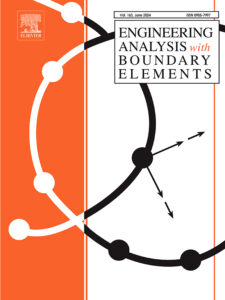An Elsevier journal has expressed concern over 73 papers with evidence of manipulated peer-review and rigged citations.
Last July, we reported that Masoud Afrand, a former member of the editorial board of Engineering Analysis with Boundary Elements, had been linked to paper mill activity. At the time, Alexander Cheng, the journal’s editor in chief said Afrand had been asked to step down due to “unethical publication conduct.” (For other coverage of the journal since then, see this post by Maarten van Kampen and Alexander Magazinov.)
Cheng told Retraction Watch the journal is investigating the “temporary” expressions of concern. “Findings will be published, and actions will be taken, once investigations are completed,” he said.
The 73 notices state that the “editors are investigating the article, including contacting the authors, in line with Committee on Publication Ethics (COPE) guidelines and Elsevier’s policies. The Expression of Concern will remain appended to the article until the investigation has been completed.”
Although the articles involve many different authors, three researchers appear repeatedly. Mohammad S. Sajadi, a professor of nutrition at Cihan University in Erbil, Iraq, is an author on 24 papers published in the journal – 16 of which are now marked with expressions of concern and one of which has been retracted. According to Clarivate’s Web of Science, Sajadi’s work has garnered more than 10,000 citations.
Quynh Hoang Le, of Duy Tan University in Da Nang, Vietnam, has published 11 papers in the journal, of which two have been retracted and nine are flagged with an expression of concern. Mohammed A. Albedah, an assistant professor of material science at Majmaah University in Al Majma’ah, Saudi Arabia, published three papers, all of which are now marked with expressions of concern. None of the authors have responded to our request for comment.
Elsevier is “conducting a full investigation and cannot comment any further until the investigations are complete,” a company spokesperson said.
Like Retraction Watch? You can make a tax-deductible contribution to support our work, subscribe to our free daily digest or paid weekly update, follow us on Twitter, like us on Facebook, or add us to your RSS reader. If you find a retraction that’s not in The Retraction Watch Database, you can let us know here. For comments or feedback, email us at [email protected].

Relevant link: ForBetterScience
Maybe the RW authors can better do this citing in the body of the article. I believe this is the third comment of this type in less than two weeks.
My linking doesn’t work well. Attempt 2:
https://forbetterscience.com/2024/04/02/karimipour-saga-i-setting-boundaries/
I’m confused by the reporting here. Didn’t the EiC himself comment on RW previously that “His [Arfand’s] editorial conduct has been honorable, and I find no fault in it.” [1]? Why didn’t RW ask the EiC about the contradiction between his comments posted on RW on July 17, 2023 at 12:05 pm and the ones provided for this story?
References:
[1] https://retractionwatch.com/2023/07/11/editorial-board-member-dropped-from-journal-site-after-retraction-watch-undark-report-links-him-to-paper-mill/#comment-2175490
Rereading the old stories on RW, it appears that the EiC is claiming (in Ref. [1] above) that RW accused Afrand of “unethical publication conduct,” (full quote is “posting at the Retraction Watch about one of its editorial board members, Masoud Afrand, accusing him of unethical publication conduct”) but the EiC “find[s] no fault in” Afrand’s conduct.
So, the quotes in this story above seem jumbled up historically and factually, and should be corrected.
I would love to know what the EiC’s actual position is on the current expressions of concern.
Alternatively, if there are no issues with the present reporting, and the EiC has told RW that “Afrand had been asked to step down due to “unethical publication conduct”,” then he has contradicted his own comments in Ref. [1], in which he forcefully argues that there’s no fault in Afrand’s conduct and states that “The journal regrets that due to the bad publicity, justified or unjustified, we have asked Afrand to step down.”.
To summarize my point and source of confusion: the EiC’s own published comment on RW claims that Afrand had been asked to step down due to “bad publicity”.
So the readers are owed an explanation from the EiC about which is it, and if he finds no fault with this kind of behavior, how did the present expressions of concern come about? Were they driven by Elsevier staff if the EiC has stated that he himself “do[es] not intend to investigate” [2] matters of questionable citation patterns in the journal — an issue that appears connected with the present expressions of concern, per the story above.
References:
[2] https://retractionwatch.com/2023/07/11/editorial-board-member-dropped-from-journal-site-after-retraction-watch-undark-report-links-him-to-paper-mill/#comment-2176087